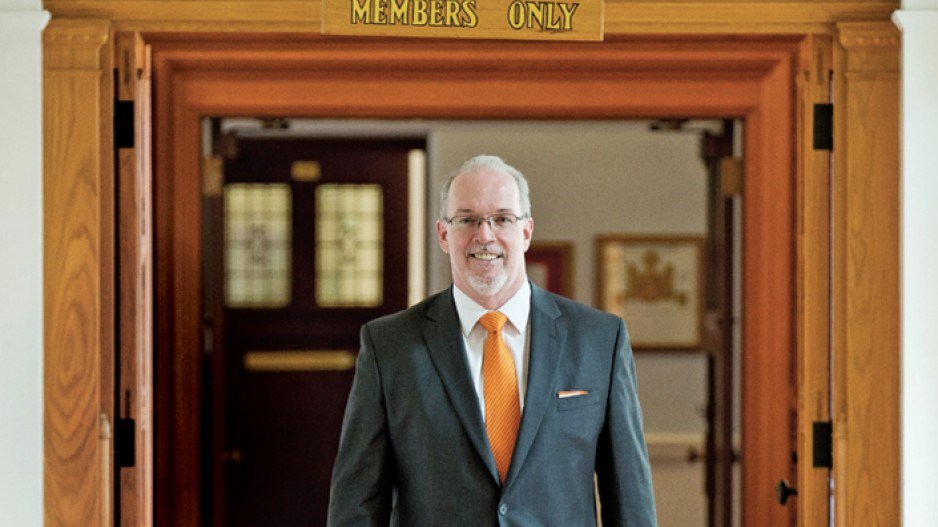An NDP government would hike B.C.'s carbon tax just enough to meet the standards set by the federal government, and would spend some of the additional money raised on things like public and clean energy.
NDP Leader John Horgan sketched out his party’s plans for carbon tax hikes February 2, just a couple of hours after his plan was leaked by the BC Liberals.
Asked how he felt about his plan being leaked, Horgan said: “If the B.C. Liberals don’t have a plan, I’m happy they’re sending mine out.”
Horgan plans to raise the tax to $50 per tonne by 2022. That’s the same carbon price target set by the federal government.
Horgan plans to give most of the money back, although it would be through rebates, not through the kind of tax offsets used by the B.C. Liberal government.
Under the NDP’s plan, the tax would increase by $6 per tonne of CO2, starting in 2020, then rise by $7 per tonne every year thereafter until 2022. A $50 per tonne carbon price would add an estimated $0.11 to a litre of gasoline in Canada.
The biggest difference between Horgan’s plan and the B.C. Liberals’ carbon tax is that the additional tax revenue generated by the tax hikes would not be offset with tax reductions elsewhere, as is currently done under a revenue neutral model.
B.C.’s carbon tax is, by statute, revenue neutral. In practice, though, it is actually revenue negative. British Columbians actually get more back in tax reductions than they pay in carbon taxes.
Between 2008 and 2015, the carbon tax generated $7.3 billion, but was offset by $8.9 billion in tax decreases elsewhere, such as a 2% reduction on personal income taxes for those in the two lower income tax brackets.
The NDP plan would not offset taxes as the carbon tax increases. However, it would cut cheques to about 80% of British Columbians in annual rebates.
“We want to make sure that corporations that are doing most of the polluting and profiting from it are paying their fair share, not average families,” Horgan said.
Asked how much additional revenue the incremental increases would bring in for the government, Horgan had no answer. He also couldn’t say how much a typical rebate cheque would be. He said those details will come later when the NDP formally launches its election campaign platform.
B.C. was the first province to implement a broad-based carbon tax, and it is the only one that made it revenue neutral.
However, it has been frozen at $30 per tonne since 2013, and it appears that whatever impact it was having to lower greenhouse gas emissions has now stopped working. The government admits it will not be able to reach its own GHG reduction targets.
“Under her (Clark’s) plan, carbon pollution has been going up and we need to make sure it’s going down,” Horgan said.
While Horgan said trade-exposed industries like cement plants might get a break under his plan, natural gas producers wouldn’t. His plan calls for sector-by-sector targeted emissions reductions.
“In the gas sector, for example, fugitive emissions, emissions from flaring, are not adequately addressed now,” Horgan said. “We want to make sure that that happens.”
B.C. Environment Minister Mary Polak said Horgan’s plan may not go over so well in communities outside of the Lower Mainland, because it will mean rural residents will be paying higher carbon taxes to help pay for things like public transit in the Lower Mainland.
The idea of raising carbon taxes to pay for public transit in Metro Vancouver has been floated before.
“Mayors and communities outside of Metro Vancouver were not excited about the prospect of having their carbon tax that’s collected in Fort St. John or Terrace or Kitimat or Kamloops going to fund transit in Metro Vancouver,” Polak said.
Horgan’s plan was welcomed by Clean Energy Canada and the Pembina Institute.
“We are pleased to see the commitment to implementing the recommendations of the premier’s Climate Leadership Team, which plot a course to significantly reduce B.C.’s carbon pollution — in particular, the pledge to adopt the proposed 2030 target and sector-by-sector targets for emissions,” said Josha MacNab, B.C. director for the Pembina Institute.




